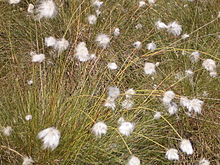Eriophorum vaginatum, the hare's-tail cottongrass,[1] tussock cottongrass, or sheathed cottonsedge, is a species of perennial herbaceous flowering plant in the sedge family Cyperaceae. It is native to bogs and other acidic wetlands throughout the Holarctic Kingdom. It is a 30–60 cm high tussock-forming plant with solitary spikes.
| Hare's-tail cottongrass | |
|---|---|

| |
| Scientific classification | |
| Kingdom: | Plantae |
| Clade: | Tracheophytes |
| Clade: | Angiosperms |
| Clade: | Monocots |
| Clade: | Commelinids |
| Order: | Poales |
| Family: | Cyperaceae |
| Genus: | Eriophorum |
| Species: | E. vaginatum
|
| Binomial name | |
| Eriophorum vaginatum | |
Description edit
Eriophorum vaginatum is a 30– to 60-cm-high tussock-forming plant with extremely narrow, almost hair-like leaves. On the flowering stems there is a single, inflated leaf-sheath, without a lamina, hence the species epithet ("sheath" is "vagina" in latin). The inflorescence is a dense, tufted, solitary spike.[2] Fruiting stems elongate considerably, reaching well above the leaves.
Distribution and habitat edit
Eriophorum vaginatum occurs throughout much of the boreal and arctic zones of Eurasia and North America. It prefers acidic, moist to wet, peaty soil and may be dominant in bogs, poor fens and the heathlands of Western Europe. It is also common on the tundra.[3][2] Common in Scotland, it is sometimes referred to as draw-ling or drawmoss.[4][5]
References edit
- ^ BSBI List 2007 (xls). Botanical Society of Britain and Ireland. Archived from the original (xls) on 2015-06-26. Retrieved 2014-10-17.
- ^ a b Howard, Janet L. (1993). "Eriophorum vaginatum". Fire Effects Information System (FEIS). US Department of Agriculture (USDA), Forest Service (USFS), Rocky Mountain Research Station, Fire Sciences Laboratory. Retrieved 24 February 2012.
- ^ Wein, R.W. (1973). Eriophorum vaginatum L. Journal of Ecology, 61, 601-615.
- ^ "Dictionaries of the Scots Language:: SND :: Draw".
- ^ Highlands and Islands, Darling and Boyd,Pub.Collins, The Fontana New Naturalist,1969.